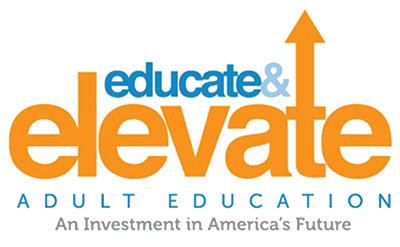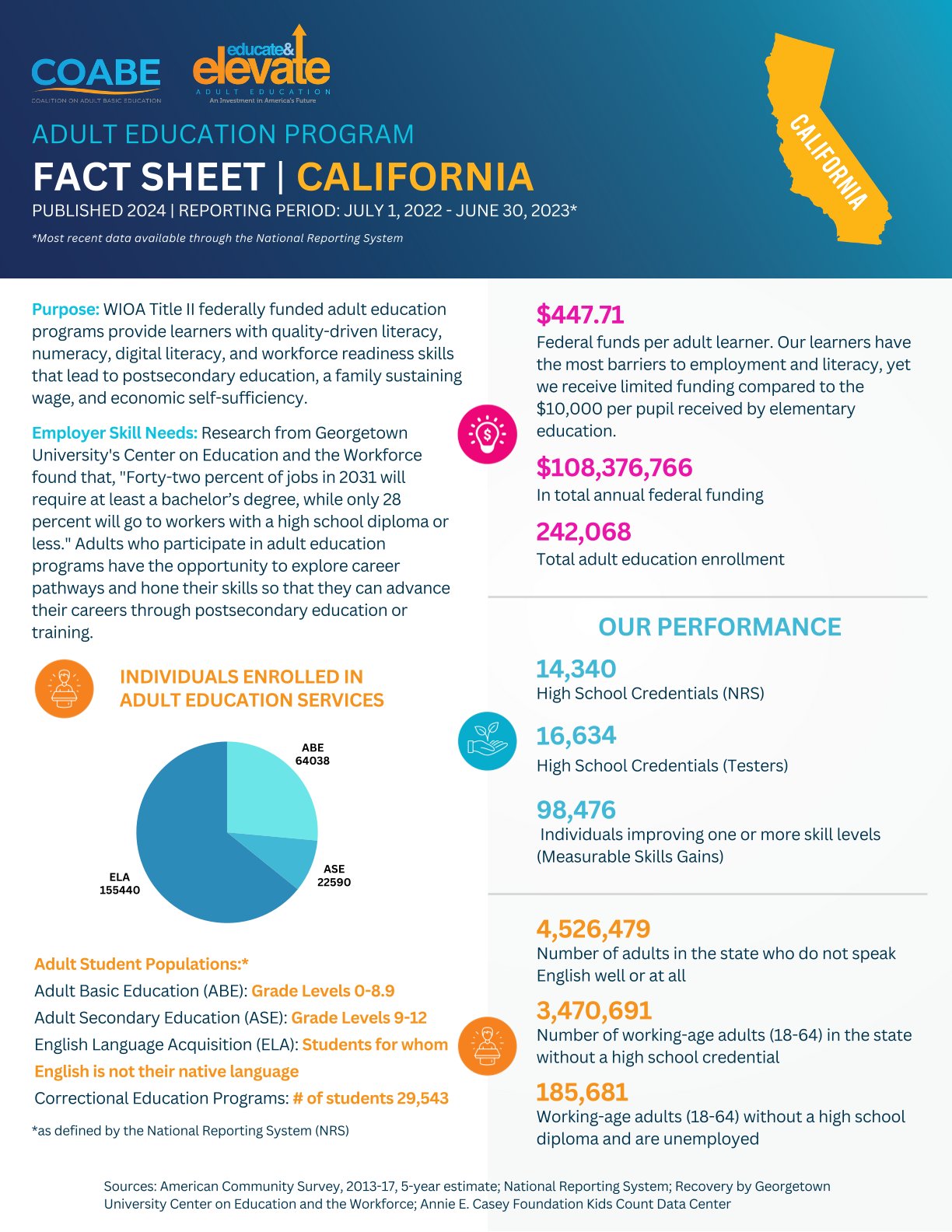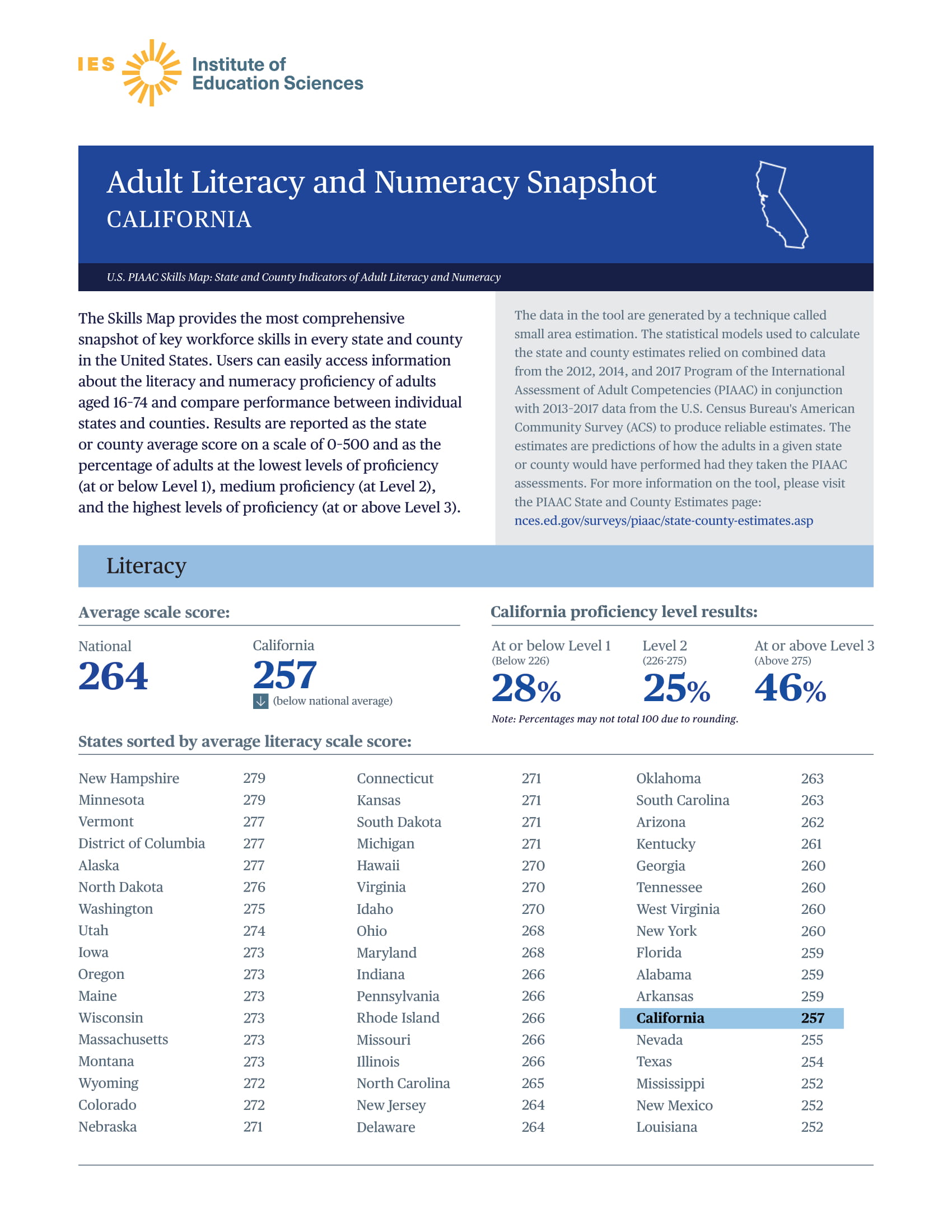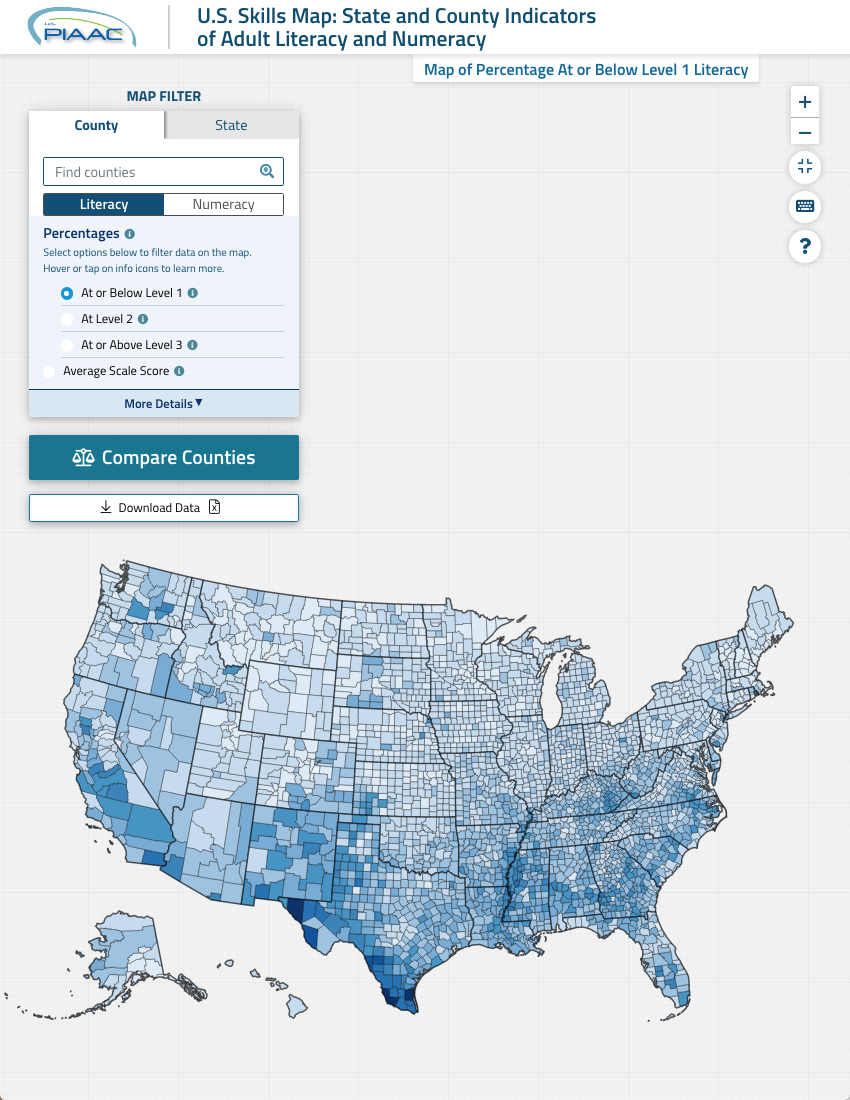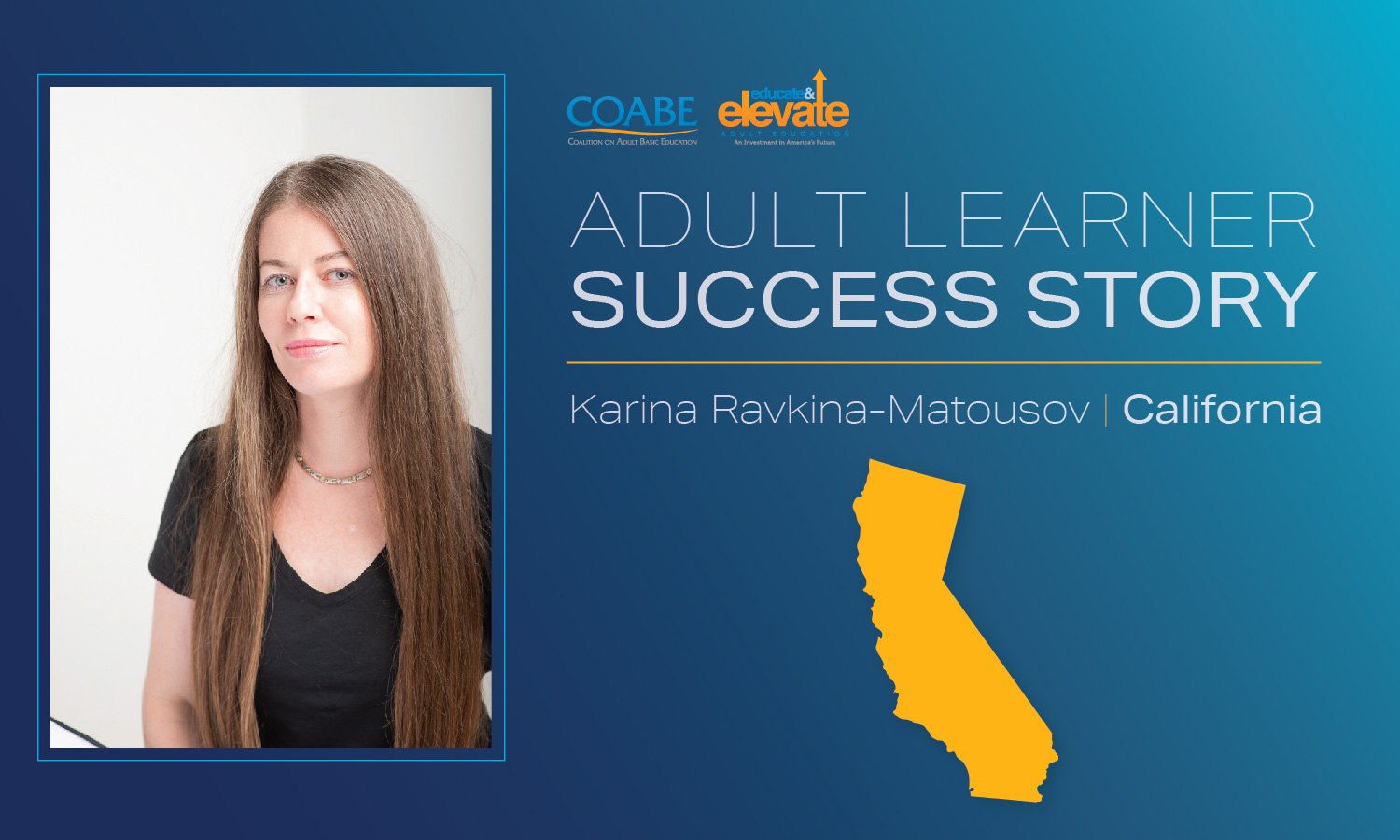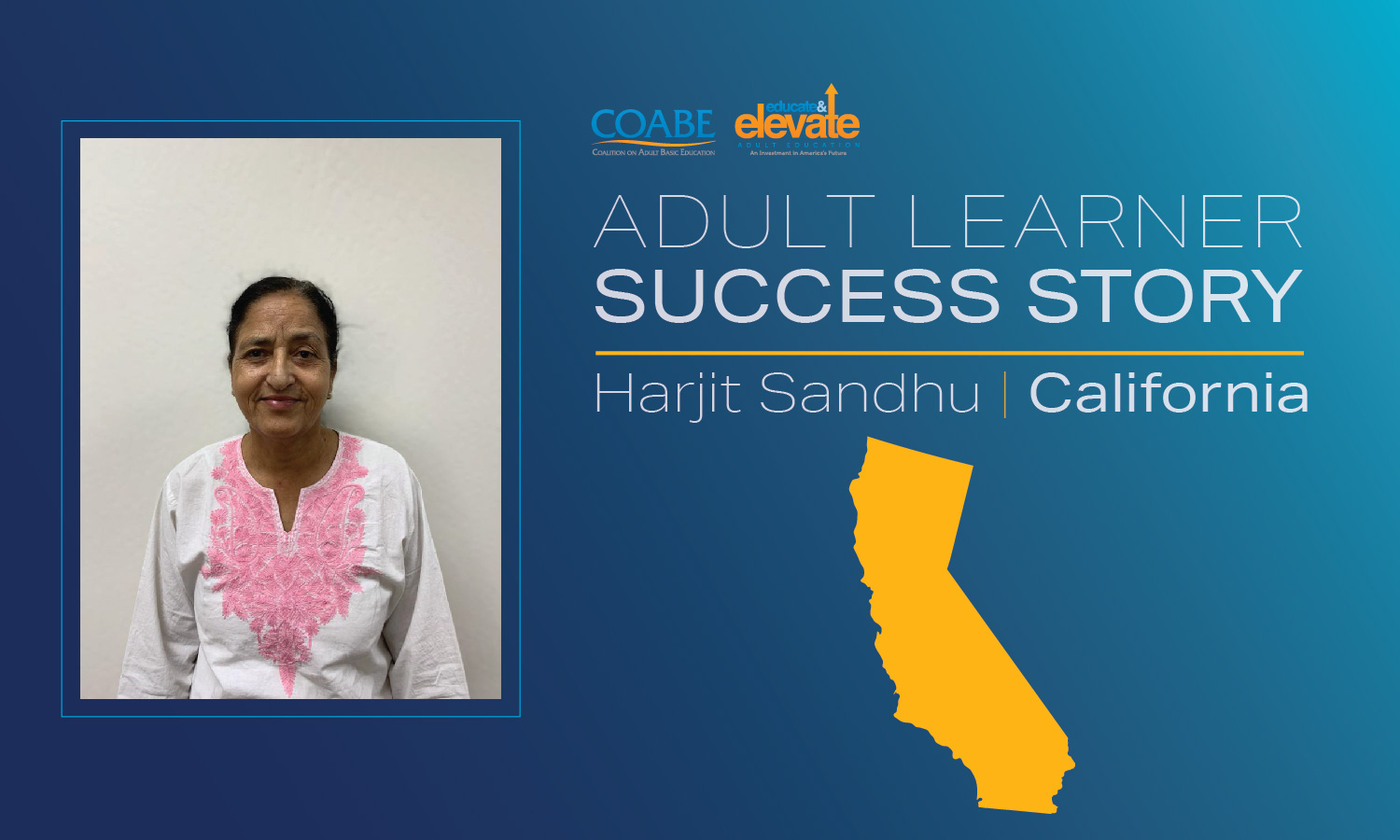Check out California’s Adult Education Campaign at www.EducateandElevateCA.org
Adult Learner Success Stories
Karina needed a program that would allow her to work a full time job and complete her high school education. Adult education met her where she was at, and propelled her to success beyond her wildest dreams.
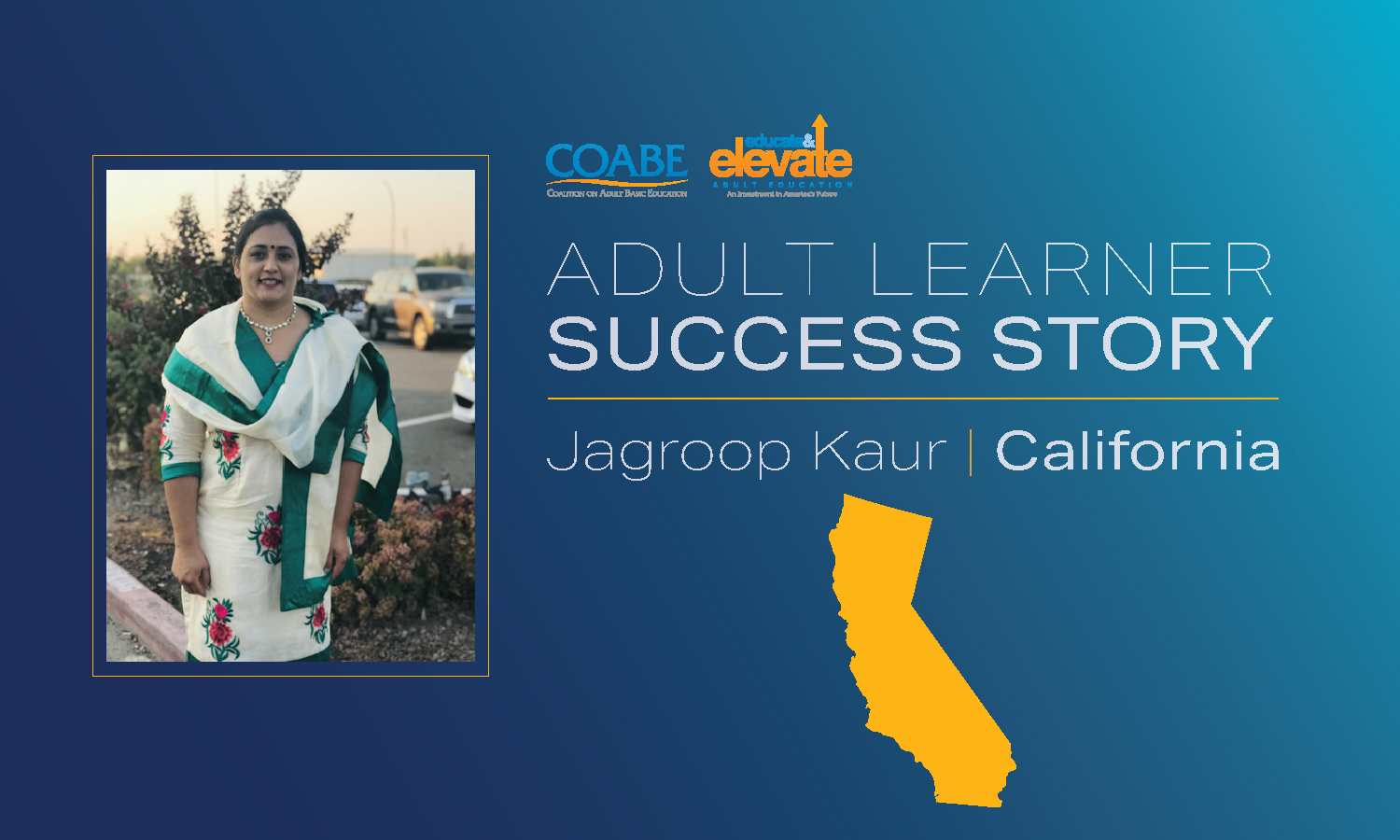
A teacher and mother from India, Jagroop came to Sacramento full of excitement for a new job. The reality of finding one, however, felt difficult and intimidating. Adult education helped Jagroop to find a rewarding career that utilized her gifts.
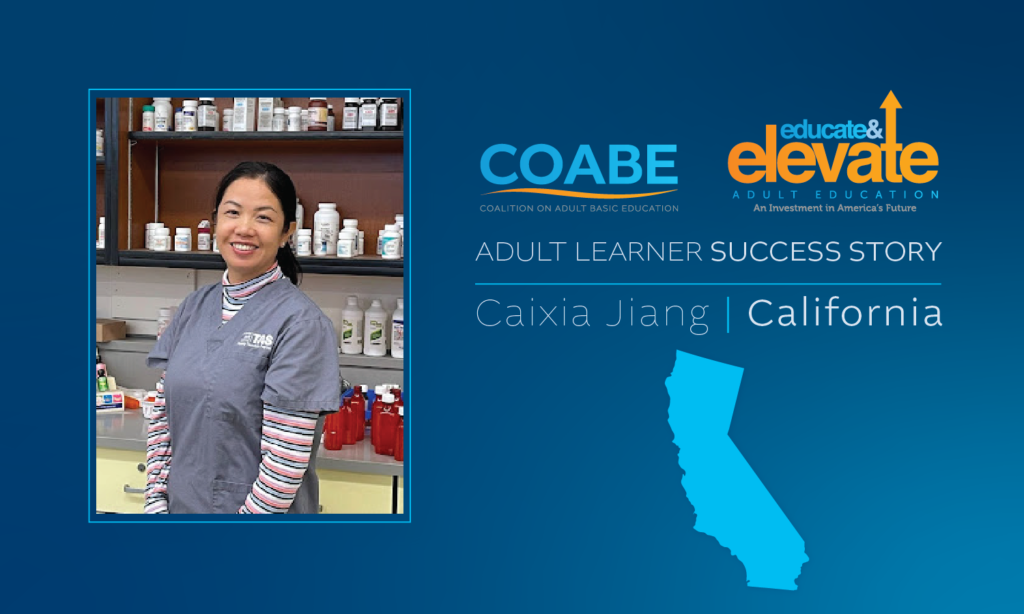
Initially hoping to just learn English, adult education inspired Caixia Jiang to get her HSE diploma and pursue a career. Today her career path has shown her that in America, the sky’s the limit.
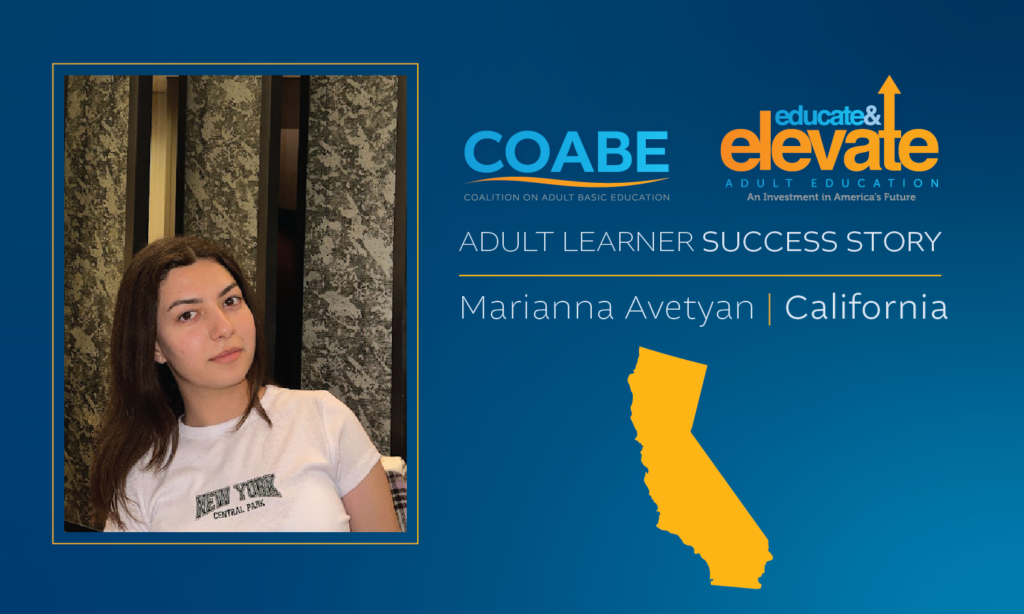
State Reports on Adult Education
California
About CAEP
California Adult Education Program
The California Community College Chancellor’s Office (CCCCO) and the California Department of Education (CDE) are working in partnership to implement the California Adult Education Program (CAEP). The 2017-18 budget appropriate $500 million for the block grant following with another $500 million in 2018-19 in addition to $25 million for data and accountability funding as well as an additional $5 million for CAEP technical assistance. The CAEP appropriates these funds through regional consortia consisting of community college districts, school districts and county offices of education to implement regional plans to better serve the needs of adults.
There are 71 regional consortia across the state that include members from community colleges, k-12 adult schools, county offices of education and a variety of community partners including, but not limited to local workforce investment boards, libraries, and community-based organizations.
State Innovations
California
Regional Asset and Pathways Website
Capital Adult Education Regional Consortium
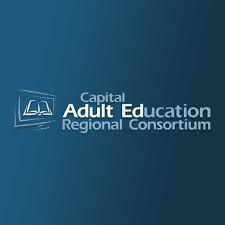 The Challenge
The Challenge
The Capital Adult Education Regional Consortium (CAERC) is comprised of 14 members and 24 partners and expands across multiple counties: Sacramento, Yolo, El Dorado and Amador. During Assembly Bill 86 planning, members voted unanimously to implement the top five regional strategies: (1) expand adult education course offerings; (2) develop regional asset and pathways roadmap; (3) align courses and streamline pathways; (4) provide professional development; and (5) analyze regional labor market and needs to align implementation and expansion. With a consortium that is geographically vast and expanding, a strategic outreach plan was needed to ensure adult learners know about the programs available and educational pathways to support learner success.
The Solution
The CAERC Regional Asset Map and Pathways website promotes outreach, communication, alignment, collaboration and efficiency of services in the region. The website was developed in two phases. In phase one, the regional asset map identified the adult basic education (ABE), adult secondary education (ASE), and English as a second language (ESL) classes offered by CAERC members and partners across the region. Phase two expanded the search capabilities of the site to connect learners to a career exploration tool, job skills programs, and career technical education (CTE) programs. The goal was to capitalize on technology and the digital age to increase access to programs and information, a strategy that also promotes consortium-wide collaboration and fosters a shared online presence in the community.
The Outcome
Phase two of the CAERC Regional Asset Map and Pathways website went live on June 30, 2017. The site uses a mobile responsive platform and features Google Maps and its route-planning capabilities for traveling by foot, car, bicycle or public transport. As of July 2017, visitors to the site can find 107 classes, 40 job skills programs and 80 CTE programs.
Teacher Academy
Placer School for Adults
Auburn, California
 The Challenge
The Challenge
The challenge? What an interesting question. The answer to the question, which is just another question, was how to change the way we have done things for so long? How to integrate from the bottom to the top. How to innovate, educate, invigorate, and clear the path for our students to come in one door, and then leave by a multiplicity of other doors that lead to internships, career paths, further education, and so much more.
The Solution
The solution required something bold, something global and unifying. The answer has always been right in front of us—and yet obscure. The answer was to create a Teacher Academy in which we twice yearly bring all of our part-time teachers into one space for a paid 8 hour day. In this day we explore with them data (CASAS/TOPS Enterprise), teaching practices, curriculum, and a new picture and model of integration. A model in which everything we now do as a school leads our students to career pathways and possibly further schooling. A new model which does all of this in a way that uses the resources we have already developed and created integrations we could only come to as a group.
The Outcome
The outcome has been the development of two integrated pathways based on collaboration between our CMA program instructors, our Business Office Profession instructor, and our ESL and ABE instructors. This is just the tip of the iceberg. The Teacher Academy, the training, the opportunity for teachers from different areas of the adult school to collaborate and dialog on many other possibilities, has led to the beginnings of a culture of collaboration and integration.
Read more Adult Education Innovations
Employer Success Stories
California
Building Skills Partnership (BSP)
UCLA Labor Center
Los Angeles, California
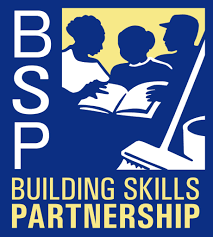 The Challenge
The Challenge
Los Angeles janitors clean the city’s largest metropolitan buildings, yet their children attend some of the city’s most under-resourced public schools. Ninety percent of janitorial workers are immigrant workers and often work difficult hours and hold multiple jobs. As a result, many struggle to access educational resources for their children.
The Solution
In collaboration with the UCLA Labor Center, the Parent Worker Project aims to improve educational opportunities for janitors’ families and communities. Through this project, parents and young children participate in workshops, field trips, and cultural activities at worksites, schools, and the union. For example, recently families attended a college tour at UC Santa Barbara, as well as a field trip to the California Science Center. For many janitor parents and their children, it was the first time setting foot on a college campus. In addition, BSP facilitates college workshops for the high school aged kids of janitors and science activities for children ages 5-12.
The Outcome
The Parent Worker Project trains a cohort of janitor parents and union members of SEIU-United Service Workers West, who will become advocates for their children’s education. It has been successful in reaching the entire household to improve student outcomes and keep dynamic, productive workers in the workforce. The project overcomes barriers common to the immigrant experience by providing a pathway to higher education to lift families out of poverty.
Ventura Adult and Continuing Education Center
Ventura, California
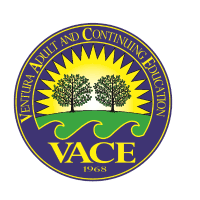 The Challenge
The Challenge
In April 2017, the Workforce Education Coalition started a regional IT guild designed to offer local employers an opportunity to identify industry needs in the field. The challenge was to find qualified, entry-level employees who possessed the IT industry certifications and basic skills necessary to retain employment. Guild and Ventura Adult Continuing Education (VACE) advisory committee members helped by offering unpaid internships, on-the-job-training opportunities, and jobs. Another challenge emerged when VACE placed a deaf career technical education (CTE) graduate at an internship. Initially, the employer was concerned about his ability to communicate with the student, who was skilled and focused, with both A+ and N+ certifications.
The Solution
A number of organizations partnered to find a solution that led to the student intern eventually becoming a valued, full-time employee. The student immigrated from India to the United States during high school. He learned American Sign Language when English was not his first language. While attending CTE training, interpreters were provided by VACE and the Department of Rehabilitation (DOR), as needed. However, he used technology to communicate through text, thereby making it possible to successfully interact with others during the internship. A concerted effort was made to develop an on-the-job-training site at STS Technology. A job coach was provided to facilitate the interview and to ensure that the student transitioned into the work environment. Networking and support from the members of the IT Guild, Workforce Education Coalition, and VACE’s Program Advisory Committee were key elements to success.
The Outcome
The employer was able to hire a highly skilled computer technician capable of utilizing the analytical and troubleshooting skills he learned as part of a CTE program offered through VACE. The internship provided the employer with an opportunity to test the student’s skills before committing to hiring. The DOR assisted with the job coaching. Initially, the student served as a “bench tech,” until his greater capabilities became clear. The school was able to successfully provide the IT Program Advisory Committee members with a valued employee. Lastly, the IT guild was able to fulfill its goal by offering a local employer an opportunity to identify its needs and be provided with a well-trained candidate to hire.
Read more Employer Success Stories
Testimonials
California
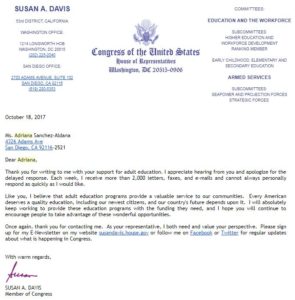
“I believe that adult education programs provide a valuable service to our communities. Every American deserves a quality education, including our newest citizens, and our country’s future depends upon it. I will absolutely keep working to provide these education programs with the funding they need, and I hope you will continue to encourage people to take advantage of these wonderful opportunities.”
“I am the customer, a life long learner attending Foothills Adult classes in El Cajon, CA. I am an artist, learning all I can each and every week from my wonderful instructor Drew Bandish. Now my daughter comes with me, and we have a wonderful art session every Tuesday. As Drew is a very good artist, he knows what we need to learn and how to explain it in easy lessons. He has improved my technique many, many times over, and as a senior lady, I enjoy the experience of meeting other artists. Great friendships have been made with the other students. I could not afford to do this at a college. It has been a wonderful opportunity.”
